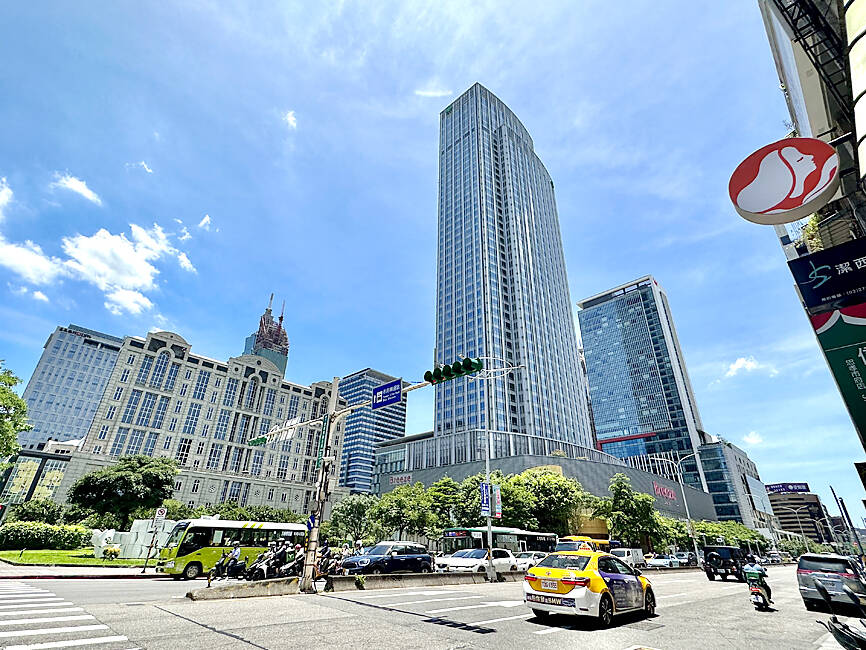The vacancy rate for Grade-A offices in Taipei last quarter was unchanged at 2.7 percent, while rents climbed 1.3 percent from a year earlier, as companies maintained a cautious approach about spending amid economic weakness, property consultancy Jones Lang LaSalle (JLL) Taiwan said on Tuesday.
“The vacancy rate has consolidated within the 3 percent range, indicating the leasing market remains healthy, despite the economic slowdown,” JLL Taiwan said, adding that rent increased due to a tight supply of upscale offices in the city’s prime Xinyi District (信義).
However, economic uncertainty has turned corporate tenants conservative about expanding, which would constrain the pace of rent hikes ahead, the consultancy said.

Photo: Hsu Yi-ping, Taipei Times
JLL Taiwan managing director Kevin Hou (侯文信) said that commercial properties were not spared the impact of the economic slowdown, but nonetheless performed better than expected last quarter.
That was because regular rent income proved a good defense against inflation, a quality that is not easily replaced by other investment tools, Hou said.
The commercial property market might gain further momentum in the second half if the local economy comes out of the woods, Hou said.
In particular, JLL Taiwan said it has spotted growing demand for environmental, social and governance (ESG) green buildings, as Taiwan is seeking to achieve net zero carbon emissions by 2050.
A JLL survey showed that 65 percent of Grade-A office spaces in Xinyi have green architecture certifications, with six buildings owning multiple green certifications.
A considerable number of Grade-A building landlords have introduced plans to help tenants purchase green energy, with life insurers the most active, JLL said.
More than 55 percent of Grade-A offices in Xinyi District operate on green energy and this percentage is likely to rise in line with the global leasing trend, the consultancy said.

UNCERTAINTY: Innolux activated a stringent supply chain management mechanism, as it did during the COVID-19 pandemic, to ensure optimal inventory levels for customers Flat-panel display makers AUO Corp (友達) and Innolux Corp (群創) yesterday said that about 12 to 20 percent of their display business is at risk of potential US tariffs and that they would relocate production or shipment destinations to mitigate the levies’ effects. US tariffs would have a direct impact of US$200 million on AUO’s revenue, company chairman Paul Peng (彭雙浪) told reporters on the sidelines of the Touch Taiwan trade show in Taipei yesterday. That would make up about 12 percent of the company’s overall revenue. To cope with the tariff uncertainty, AUO plans to allocate its production to manufacturing facilities in

Taiwan will prioritize the development of silicon photonics by taking advantage of its strength in the semiconductor industry to build another shield to protect the local economy, National Development Council (NDC) Minister Paul Liu (劉鏡清) said yesterday. Speaking at a meeting of the legislature’s Economics Committee, Liu said Taiwan already has the artificial intelligence (AI) industry as a shield, after the semiconductor industry, to safeguard the country, and is looking at new unique fields to build more economic shields. While Taiwan will further strengthen its existing shields, over the longer term, the country is determined to focus on such potential segments as

TAKING STOCK: A Taiwanese cookware firm in Vietnam urged customers to assess inventory or place orders early so shipments can reach the US while tariffs are paused Taiwanese businesses in Vietnam are exploring alternatives after the White House imposed a 46 percent import duty on Vietnamese goods, following US President Donald Trump’s announcement of “reciprocal” tariffs on the US’ trading partners. Lo Shih-liang (羅世良), chairman of Brico Industry Co (裕茂工業), a Taiwanese company that manufactures cast iron cookware and stove components in Vietnam, said that more than 40 percent of his business was tied to the US market, describing the constant US policy shifts as an emotional roller coaster. “I work during the day and stay up all night watching the news. I’ve been following US news until 3am

COLLABORATION: Given Taiwan’s key position in global supply chains, the US firm is discussing strategies with local partners and clients to deal with global uncertainties Advanced Micro Devices Inc (AMD) yesterday said it is meeting with local ecosystem partners, including Taiwan Semiconductor Manufacturing Co (TSMC, 台積電), to discuss strategies, including long-term manufacturing, to navigate uncertainties such as US tariffs, as Taiwan occupies an important position in global supply chains. AMD chief executive officer Lisa Su (蘇姿丰) told reporters that Taiwan is an important part of the chip designer’s ecosystem and she is discussing with partners and customers in Taiwan to forge strong collaborations on different areas during this critical period. AMD has just become the first artificial-intelligence (AI) server chip customer of TSMC to utilize its advanced